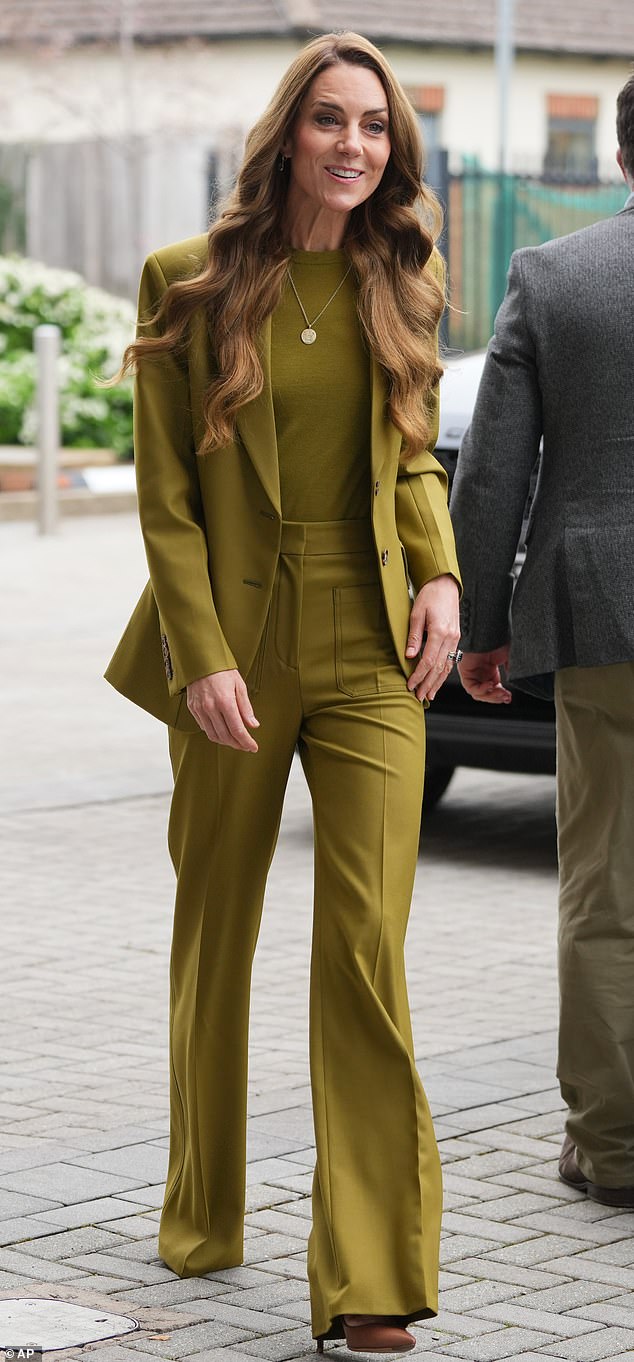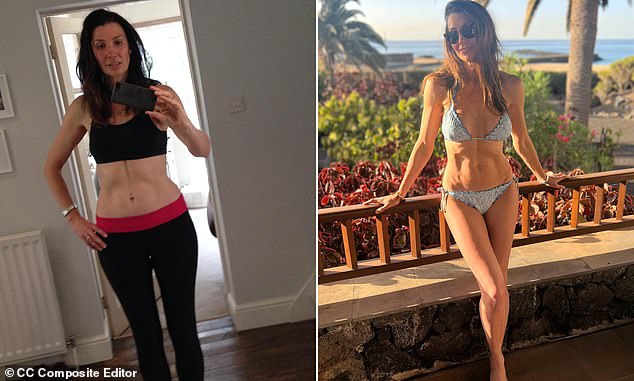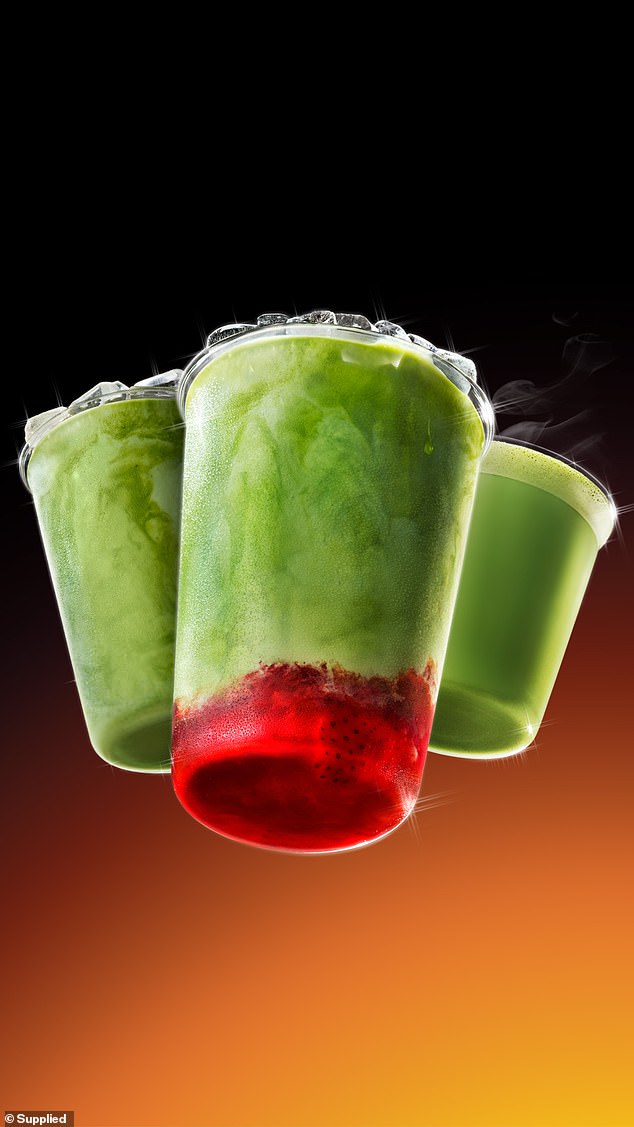The Princess of Waleslooked stunning in a Victoria Beckham suit as she met with families and volunteers at non-profit Home-Start in Oxford today.
Kate, 43, chatted with individuals involved with the organisation, which is committed to promoting the welfare of families with children under five, about how everyday moments of love and connection help secure a child’s future happiness.
She opted to wear a VB patch pocket jacket, retailing for £850, and matching £490 ‘Alina’ trousers, both in the colour ‘willow’, likely a show of support for Posh Spice on the release day of her new Netflixdocumentary.
Victoria’s three-part Netflix series, released this morning, follows the former pop star’s manic run-up to her Paris Fashion Weekshow last September, and has already received rave reviews from critics.
For today’s visit, Kate chose to wear her chocolate tresses down and in loose waves, and opted for a glamorous makeup look, complete with brown eyeshadow and a dusky pink lip.
Today’s engagement echoes the message of Kate’s essay, released earlier today via the Royal Foundation’s Centre for Early Childhood, which highlighted the importance of meaningful connections for a child’s mental and physical wellbeing later in life.
Home-Start is currently preparing to roll out training based on the centre’s explainer series to its 9000-strong network of volunteers across all local Home-Start centres.
The series, made of a string of animated films, translates science into practical, everyday actions that help parents and practitioners build nurturing interactions.

The Princess of Wales looked chic in a Victoria Beckham suit as she visited Home-Start charity in Oxford today
On Thursday, Kate joined a training session alongside volunteers, who viewed the films and reflected on how they can use the strategies discussed to promote nurturing interactions in their family support groups and between the parents, babies, and young children they work with.
Home‑Start, one of 27 organisations now using the explainer series, will work alongside the centre to collect data, which will in turn allow effective approaches to be scaled and shared.
Kate has long championed the importance of social and emotional development in early childhood and the profound effect it has on the lives people lead and the type of society built.
Today’s trip and the publication of the essay reflect Kate’s ongoing dedication to early years.
The essay titled, ‘The Power of Human Connection in a Distracted World’, was written in collaboration with Boston-based Professor Robert Waldinger of Harvard University.
The piece highlights two core points: warm, loving, and meaningful relationships are the single greatest investment we can make for health, happiness and longevity; and modern life, rising loneliness, and fragmented attention are undermining our ability to form those connections, putting at risk the social and emotional development of babies and young children.
Spending too much time online is said to be a factor contributing to the ‘epidemic of disconnection’, which in turn can disrupt family life.
‘Our smartphones, tablets, and computers have become sources of constant distraction, fragmenting our focus and preventing us from giving others the undivided attention that relationships require,’ the essay reads.

The mother-of-three smiled as she interacted with a child during the visit to Home-Start in Oxfordshire

Katejoined a training session where the volunteers viewed the films and reflected on how they can use these strategies to promote nurturing interactions in their family support groups

Kate sat among volunteers and discussed the best methods of promoting nurturing interactions among children and their parents
‘We sit together in the same room while our minds are scattered across dozens of apps, notifications, and feeds. We’re physically present but mentally absent, unable to fully engage with the people right in front of us.’
The essay went on to explain the importance of a happy and nurturing family life on a child’s current and future happiness, relationships, and success.
Technology, they said, is threatening those safe environments. ‘But just as science is confirming the lifelong importance of connections, we exist in a world that is more distracted than ever,’ she wrote.
‘We’re raising a generation that may be more ‘connected’ than any in history while simultaneously being more isolated, more lonely, and less equipped to form the warm, meaningful relationships that research tells us are the foundation of a healthy life.’
To overcome the ‘epidemic of disconnection’, Kate warned readers to make a ‘conscious effort’ to be present for the people they care about, creating safe spaces for genuine connections, whether that be family dinners or making eye contact.
The essay concluded, ‘Look the people you care about in the eye and be fully there – because that is where love begins.
‘For babies and children who are raised in attentive and loving environments are better able to develop the social and emotional skills that will allow them to grow into adults capable of building loving partnerships, families, communities. This is our children’s greatest inheritance.’
It comes after Prince William revealed that none of his children are allowed have mobile phones as he spoke about the importance of sitting down at the table for family meals.

Pictured:Kate posed for a photograph with Home-Start Oxford families, and the volunteers who support them

Kate looked animated as she chatted with volunteers at the non-profit organisation in Oxford today
The Prince of Wales said he and his wife Kate had imposed a ‘strict’ ban on the devices for Prince George, 12, Princess Charlotte, 10, and Prince Louis, seven.
William, 43, added that he wants to ‘do what’s best for my children’ in an appearance on actor Eugene Levy’s Apple TV+ travel series The Reluctant Traveler.
When Levy asked if the Waleses and their children eat together, the Prince said, ‘Yes absolutely, yes definitely. So, we sit and chat, it’s really important. None of our children have any phones, which we’re very strict about.’
It comes amid the growing Smartphone Free Childhood movement in which parents commit to only give their child a smartphone aged 14, with no social media until 16.
Among those leading calls to ban smartphones in schools in recent months have been Esther Ghey, the mother of murdered transgender teenager Brianna Ghey.
Jack Thorne, creator of Netflix hit Adolescence, has also backed the campaign amid calls for better legislation to help parents navigate dangers of the online world.
In February, Barnet Council in London became the UK’s first to ban smartphones from all its schools, in a rule affecting more than 60,000 pupils since this month.
While Barnet was the first local authority to include secondary schools in a phone ban, other councils across England including Ealing, St Albans, Cambridgeshire, Petersfield and Hampshire have also prohibited phone use in primary schools.
Meanwhile, a Dutch social movement called The Offline Club is burgeoning, which organises UK community events where attendees lock their phones away.
Joe Ryrie, co-founder and director of Smartphone Free Childhood, told the Royale, ‘We don’t know if William and Kate have signed the Smartphone Free Childhood Parent Pact, but they’re clearly on board with the idea that childhood is too short to scroll away on a smartphone.
‘Managing phones and social media is one of the toughest challenges facing parents today – whether you’re a future king or a knackered parent at the school gates.
‘But more and more families are realising that kids are happier and healthier without a smartphone before 14. And as more parents choose to delay together, it’s becoming easier for everyone – royal or otherwise.’
The Online Safety Act came into effect this year, providing a new set of laws that protect children and adults online.
The Act has given providers new duties to implement systems and processes to reduce the risk that their services are used for illegal activity, and to take down illegal content when it does appear.
Specific protections have been designed for children. Platforms are required to prevent children from accessing harmful and age-inappropriate content, and provide parents and children with clear and accessible ways to report problems online when they do arise.
During William’s interview with Levy, he spoke about how the children take part in a range of activities without the distraction of mobile phones.
The Prince said, ‘So, Louis loves the trampoline, so he’s obsessed with trampolining and actually Charlotte does a lot as well.
‘As far as I can tell they just end up jumping up and down on the trampoline, beating each other up, most of the time. Apparently, there is an art to it.
‘Charlotte does her netball as well and her ballet and so keeping them busy with sports and being outdoors is really important.’
Kate advocates children spending time in the natural world and helped create the family-friendly Back To Nature play garden that was exhibited at the Chelsea Flower Show in 2019.
And William spoke last month about making sure his children grow up learning to play an instrument as he believes music is ‘crucial’, with Charlotte reportedly following in her mother’s footsteps and learning the piano, George is thought to play the guitar and Louis has drum lessons.
The Prince told Levy, ‘They’re trying to learn musical instruments. I’m not sure how successful we’re being with that. George loves his football and his hockey…’
George also appears to have a love of history, with his father saying the young Prince is the person to ask about facts when Levy joked the Windsors would not have to go on the family history show Who Do You Think You Are?
William tells the actor, during the episode called Living The Royal Life In The UK, ‘I think I probably need some history lessons, Eugene. So, I could do with that.
‘Actually, George my son is way better in history than I am and I have to check with him now on my dates.’
William also spoke about how he was trying to avoid the ‘mistakes’ his parents made.
The Prince said his childhood ‘feeling of safety, security, love’ was cut short when his mother Princess Diana and father King Charles III separated when he was a young boy.
He told Levy, ‘Getting the balance of work and family life right is really important.
‘Because for me, the most important thing in my life is family, and everything is about the future and about if you don’t start the children off now with a happy, healthy, stable home, I feel you’re setting them up for a bit of a hard time and a fall.’
When Levy, star of the series Schitt’s Creek, suggested to William a ‘normal homelife’ started with his mother, the prince replied, ‘Yes definitely, I think it’s really important that that atmosphere is created at home.
‘You have to have that warmth, that feeling of safety, security, love. That all has to be there, and that was certainly part of my childhood.
‘My parents got divorced at eight, so that lasted a short period of time.
‘But, you take that and you learn from it and you try and make sure you don’t do the same mistakes as your parents.
‘I think we all try and do that and I just want to do what’s best for my children, but I know that the drama and the stress when you’re small really affects you when you’re older.’









